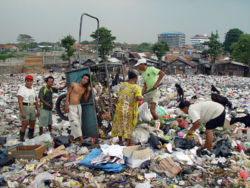Talk:Existing scarcity
From AdCiv
The key issue...
The more I think about it, the more I become convinced of several points —
- We have all the material, energy, food, water etc. that we need
- As we have enough resources, the question is whether we have enough know-how. (Following Bucky Fuller, I say 'know-how' to denote the subsection of intelligence/information that enables Man to make good use of his resources.)
- Looking at the marvellously ingenious solutions documented all over this wiki and elsewhere, it is plain that we do in fact have enough know-how
- So the key issue is this: How can we close the gap between know-how and practice? That one thing - closing the gap between know-how and practice - would solve the energy, food, water and education problems in pretty short order, and go a good way to solving the medical problems too. Extending Internet access will certainly turn out to be very important. Moving from private to open development models may or may not go some way to closing the gap; are open-source projects really any more agile than private ones? Maybe human nature just has a certain intransigence to it. One thing is certain: leading by example is the most important thing anyone can do. Solve your local problems by applying know-how, and publicize it. -- Balatro 02:23, 8 July 2010
- My feeling is that Open Source has really just begun. OS projects already cover the full spectrum from massive projects that can be slow and rather un-agile (Open Office), to much smaller projects started by a single person or small group that are very agile and fast-moving, which people may want to join later on in it's life-cycle. The overheads in starting an open-source project are so low that even if many projects are unsuccessful (which they are), there are enough of them to explore more solutions than commercial entities, so a Darwinian model appears. The larger the 'ecosystem', the more likely interesting and successful are to appear. Whatever model it is, it is just humans doing stuff together at the end of the day. I think with open-source other people are more likely to join in on a worthwhile project than if it is closed-source or proprietary, the 'friction' is much lower.
- I also think that the way open-source projects are run and contributed to (although many different models have emerged) will continue to evolve too. It has hardly kicked off at all yet in terms of hardware, as I have mentioned elsewhere, because there isn't a capable full hardware 'toolchain' yet (as there is in open-source software). And until accessible OS CAD and desktop manufacturing becomes much more widespread, it will remain nascent. --CharlesC 14:10, 11 July 2010 (CEST)
Other
- "FATAL diseases are threatening a comeback among American children as insurers fail to meet the costs of immunisation.
- Half the doctors who responded to a survey by Gary Freed of the University of Michigan Health System in Ann Arbor said they had delayed purchasing new vaccines against childhood diseases like meningitis. Twenty per cent of family doctors said they were considering halting vaccinations of privately insured children."
Images
Collecting images for the article page.
Some concepts are very difficult to portray pictorially - esp. 'lack' of certain things which simply leads to things being done inefficiently - not fatally or disastrously so, but certainly well below ideal or optimum.
The images below are more relevant to the developing world (v. important of course), but also want to convey that many of these problems afflict the so-called developed nations too.
Lacking:
Need:
Pile
Women washing their clothes in a ditch by the side of the road






